广东中考英语专项--反义疑问句语法讲解及练习(含答案)
(完整)初中英语反义疑问句专项练习(附答案)
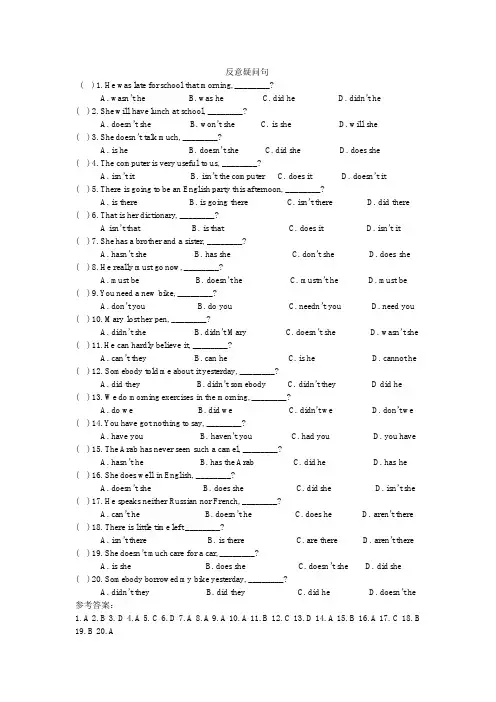
反意疑问句()1.H e w as l at e f ors choolt hatm or ni ng,________?A.w as n’theB.w as heC.di d heD.di dn’the()2.She w i l lhave l unch ats chool,________?A.does n’ts heB.w on’ts heC.i s s heD.w i l ls he()3.She does n’tt al k m uch,________?A.i s heB.does n’ts heC.di d s heD.does s he()4.The com put eri s ver y us ef ult o us,________?A.i s n’ti tB.i s n’tt he com put erC.does i tD.does n’ti t()5.Ther e i s goi ng t o be an E ngl i s h par t y t hi s af t er noon,________?A.i s t her eB.i s goi ng t her eC.i s n’tt her eD.di d t her e ()6.Thati s herdi ct i onar y,________?A i s n’tt hat B.i st hat C.does i t D.i s n’ti t ()7.She has a br ot herand a s i s t er,________?A.has n’ts heB.has s heC.don’ts heD.does s he ()8.H e r eal l y m us tgo now,________?A.m us tbeB.does n’theC.m us t n’theD.m us tbe ()9.Y ou need a new bi ke,________?A.don’tyouB.do youC.needn’tyouD.need you ()10.M ar y l os ther pen,________?A.di dn’ts heB.di dn’tM ar yC.does n’ts heD.w as n’ts he ()11.H e can har dl y bel i eve i t,________?A.can’tt heyB.can heC.i s heD.cannothe ()12.Som ebody t ol d m e abouti tyes t er day,________?A.di d t heyB.di dn’ts om ebodyC.di dn’tt hey D di d he ()13.W e do m or ni ng exer ci s es i n t he m or ni ng,________?A.do w eB.di d w eC.di dn’tw eD.don’tw e ()14.Y ou have gotnot hi ng t o s ay,________?A.have youB.haven’tyouC.had youD.you have ()15.The A r ab has nevers een s uch a cam el,________?A.has n’theB.has t he A r abC.di d heD.has he ()16.She does w el li n E ngl i s h,________?A.does n’ts heB.does s heC.di d s heD.i s n’ts he ()17.H e s peaks nei t her R us si an norFr ench,________?A.can’theB.does n’theC.does heD.ar en’tt her e ()18.Ther e i s l i t t l e t i m e l ef t________?A.i s n’tt her eB.i s t her eC.ar e t her eD.ar en’tt her e ()19.She does n’tm uch car e f ora car,________?A.i s s heB.does s heC.does n’ts heD.di d s he ()20.Som ebody bor r ow ed m y bi ke yes t er day,________?A.di dn’tt heyB.di d t heyC.di d heD.does n’the 参考答案:1.A2.B3.D4.A5.C6.D7.A8.A9.A10.A11.B12.C13.D14.A15.B16.A17.C18.B 19.B20.A。
中考英语反义疑问句、感叹句讲解及习题
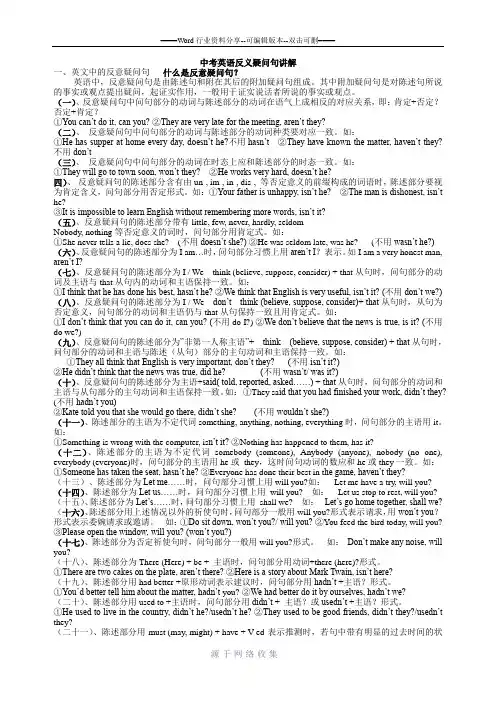
中考英语反义疑问句讲解一、英文中的反意疑问句什么是反意疑问句?英语中,反意疑问句是由陈述句和附在其后的附加疑问句组成。
其中附加疑问句是对陈述句所说的事实或观点提出疑问,起证实作用,一般用于证实说话者所说的事实或观点。
(一)、反意疑问句中问句部分的动词与陈述部分的动词在语气上成相反的对应关系,即:肯定+否定?否定+肯定?①You can’t do it, can you? ②They are very late for the meeting, aren’t they?(二)、反意疑问句中问句部分的动词与陈述部分的动词种类要对应一致。
如:①He has supper at home every day, doesn’t he?不用hasn’t②They have known the matter, haven’t they?不用don’t(三)、反意疑问句中问句部分的动词在时态上应和陈述部分的时态一致。
如:①They will go to town soon, won’t they? ②He works very hard, doesn’t he?四)、反意疑问句的陈述部分含有由un-, im-, in-, dis-, 等否定意义的前缀构成的词语时,陈述部分要视为肯定含义,问句部分用否定形式。
如:①Your father is unhappy, isn’t he? ②The man is dishonest, isn’t he?③It is impossible to learn English without remembering more words, isn’t it?(五)、反意疑问句的陈述部分带有little, few, never, hardly, seldomNobody, nothing等否定意义的词时,问句部分用肯定式。
如:①She never tells a lie, does she? (不用doesn’t she?)②He was seldom late, was he? (不用wasn’t he?) (六)、反意疑问句的陈述部分为I am…时,问句部分习惯上用aren’t I?表示。
中考英语反义疑问句讲解及练习题
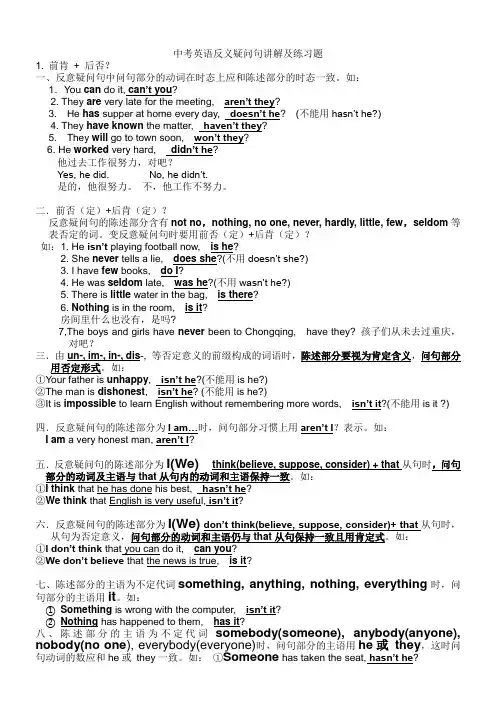
中考英语反义疑问句讲解及练习题1. 前肯+ 后否?一、反意疑问句中问句部分的动词在时态上应和陈述部分的时态一致。
如:1.You can do it, can’t you?2. They are very late for the meeting, aren’t they?3. He has supper at home every day, doesn’t he? (不能用hasn’t he?)4. They have known the matter, haven’t they?5. They will go to town soon, won’t they?6. He worked very hard, did n’t he?他过去工作很努力,对吧?Yes, he did. No, he didn’t.是的,他很努力。
不,他工作不努力。
二.前否(定)+后肯(定)?反意疑问句的陈述部分含有not no,nothing, no one, never, hardly, little, few,seldom等表否定的词。
变反意疑问句时要用前否(定)+后肯(定)?如:1. He isn’t playing football now, is he?2. She never tells a lie, does she?(不用doesn’t she?)3. I have few books, do I?4. He was seldom late, was he?(不用wasn’t he?)5. There is little water in the bag, is there?6. Nothing is in the room, is it?房间里什么也没有,是吗?7,The boys and girls have never been to Chongqing, have they? 孩子们从未去过重庆,对吧?三.由un-, im-, in-, dis-, 等否定意义的前缀构成的词语时,陈述部分要视为肯定含义,问句部分用否定形式。
中考英语反义疑问句讲解及习题!
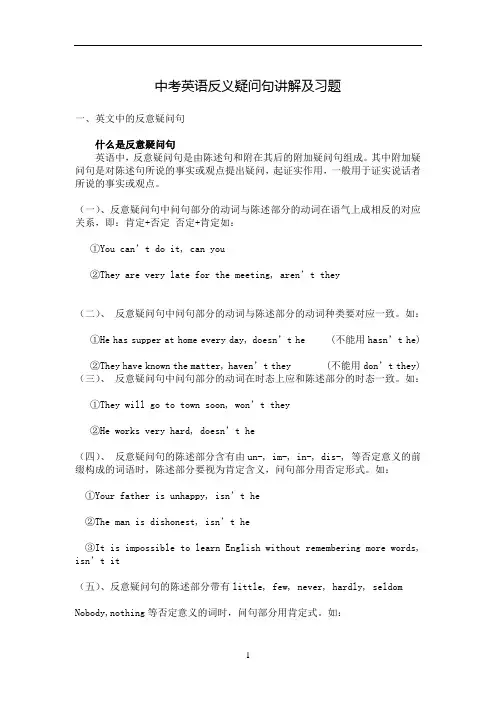
中考英语反义疑问句讲解及习题一、英文中的反意疑问句什么是反意疑问句英语中,反意疑问句是由陈述句和附在其后的附加疑问句组成。
其中附加疑问句是对陈述句所说的事实或观点提出疑问,起证实作用,一般用于证实说话者所说的事实或观点。
(一)、反意疑问句中问句部分的动词与陈述部分的动词在语气上成相反的对应关系,即:肯定+否定否定+肯定如:①You can’t do it, can you②They are very late for the meeting, aren’t th ey(二)、反意疑问句中问句部分的动词与陈述部分的动词种类要对应一致。
如:①He has supper at home every day, doesn’t he (不能用hasn’t he)②They have known the matter, haven’t they (不能用don’t they) (三)、反意疑问句中问句部分的动词在时态上应和陈述部分的时态一致。
如:①They will go to town soon, won’t they②He works very hard, doesn’t he(四)、反意疑问句的陈述部分含有由un-, im-, in-, dis-, 等否定意义的前缀构成的词语时,陈述部分要视为肯定含义,问句部分用否定形式。
如:①Your father is unhappy, isn’t he②The man is dishonest, isn’t he③It is impossible to learn English without remembering more words, isn’t it(五)、反意疑问句的陈述部分带有little, few, never, hardly, seldomNobody,nothing等否定意义的词时,问句部分用肯定式。
如:①She never tells a lie, does she (不用doesn’t she)②He was s eldom late, was he (不用wasn’t he)(六)、反意疑问句的陈述部分为I am……时,问句部分习惯上用aren’t I 表示。
(完整版)广东中考英语专项--反义疑问句语法讲解及练习(含答案)
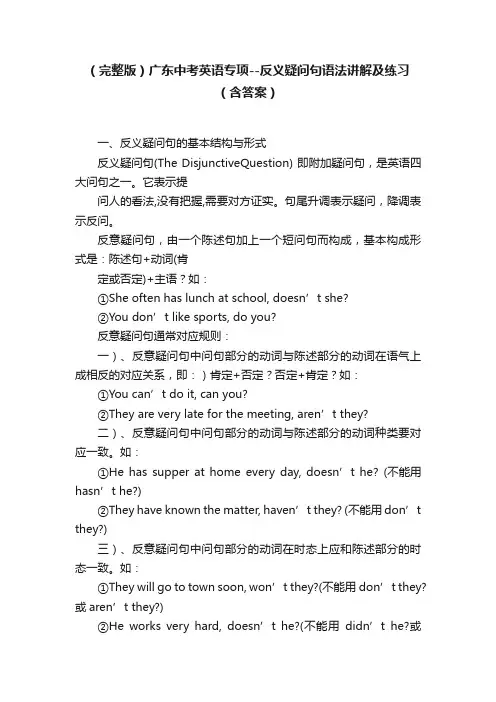
(完整版)广东中考英语专项--反义疑问句语法讲解及练习(含答案)一、反义疑问句的基本结构与形式反义疑问句(The DisjunctiveQuestion) 即附加疑问句,是英语四大问句之一。
它表示提问人的看法,没有把握,需要对方证实。
句尾升调表示疑问,降调表示反问。
反意疑问句,由一个陈述句加上一个短问句而构成,基本构成形式是:陈述句+动词(肯定或否定)+主语?如:①She often has lunch at school, doesn’t she?②You don’t like sports, do you?反意疑问句通常对应规则:一)、反意疑问句中问句部分的动词与陈述部分的动词在语气上成相反的对应关系,即:)肯定+否定?否定+肯定?如:①You can’t do it, can you?②They are very late for the meeting, aren’t they?二)、反意疑问句中问句部分的动词与陈述部分的动词种类要对应一致。
如:①He has supper at home every day, doesn’t he? (不能用hasn’t he?)②They have known the matter, haven’t they? (不能用don’t they?)三)、反意疑问句中问句部分的动词在时态上应和陈述部分的时态一致。
如:①They will go to town soon, won’t they?(不能用don’t they?或aren’t they?)②He works very hard, doesn’t he?(不能用didn’t he?或won’t he?)基础练习1. You are an actor, ________ _____ ?2. He is a good boy, ________ ______ ?3. It was fine yesterday, _______ ___ ?4. You were studying when I called you last night, __________ _____ ?5. She is going to visit me, _____ ____?6. I am Chinese, ______ ____?7. It often rains here, ________ ___ ?8. He likes soccer, _________ ____ ?9. You have a headache, _______ ___ ?10. I called you yesterday, _______ __?11. You will go to America, ______ ___ ?12. We have ever been to Shanghai, _________ ______ ?13.His mother is a doctor, ______ ____ ?14. The dogs are fighting, _______ _____?15 There is a boy in our classroom, _______ _______ ?17. There were many cars in the street,_________ ________ ?18. There will be robots in our families,________ ______ ?19. Sit down please, _______________ ?20. Please call me, _________________?21. Let’s go home,_________ ?22. Let us go home, ________________ ?23 . Let me see, __________________ ?答案1.aren't you 2.isn't he 3.wasn't it 4.didn't you 5.won't she 6.aren't 7.doesn't it 8.doesn't he9.don't you 10.didn't you 11.won't you 12.haven't we 13.isn't she 14.aren't they 15.isn't there 17.weren't there 18.won't there19.will you 20.will you 21.shall we22.will you 23.will you二、反义疑问句的回答反义疑问句的回答始终遵从事实,事实是肯定用Yes+肯定句,事实是否定用no+否定句,如事实是你喜欢英语:You like English,don't you? Yes,I do.(是的,我喜欢。
中考英语反义疑问句、感叹句讲解及习题
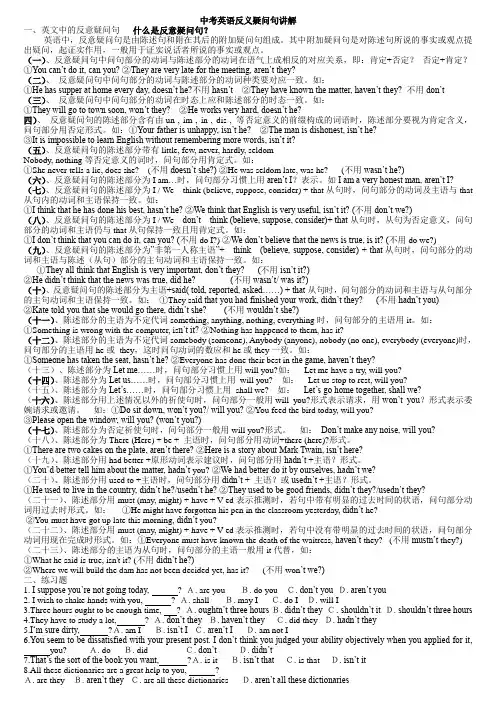
中考英语反义疑问句讲解一、英文中的反意疑问句什么是反意疑问句?英语中,反意疑问句是由陈述句和附在其后的附加疑问句组成。
其中附加疑问句是对陈述句所说的事实或观点提出疑问,起证实作用,一般用于证实说话者所说的事实或观点。
(一)、反意疑问句中问句部分的动词与陈述部分的动词在语气上成相反的对应关系,即:肯定+否定?否定+肯定?①You can’t do it, can you? ②They are very late for the meeting, aren’t they?(二)、反意疑问句中问句部分的动词与陈述部分的动词种类要对应一致。
如:①He has supper at home every day, doesn’t he?不用hasn’t②They have known the matter, haven’t they?不用don’t (三)、反意疑问句中问句部分的动词在时态上应和陈述部分的时态一致。
如:①They will go to town soon, won’t they? ②He works very hard, doesn’t he?四)、反意疑问句的陈述部分含有由un-, im-, in-, dis-, 等否定意义的前缀构成的词语时,陈述部分要视为肯定含义,问句部分用否定形式。
如:①Your father is unhappy, isn’t he? ②The man is dishonest, isn’t he?③It is impossible to learn English without remembering more words, isn’t it?(五)、反意疑问句的陈述部分带有little, few, never, hardly, seldomNobody, nothing等否定意义的词时,问句部分用肯定式。
如:①She never tells a lie, does she? (不用doesn’t she?)②He was seldom late, was he? (不用wasn’t he?)(六)、反意疑问句的陈述部分为I am…时,问句部分习惯上用aren’t I?表示。
初中英语语法专题专讲--反义疑问句讲解及练习1含答案
__________________________________________________反义疑问句【反义疑问句】(一)概念:反意疑问句是由陈述句和附在其后的附加疑问句组成。
其中附加疑问句是对陈述句所说的事实或观点提出疑问,起证实作用,一般用于证实说话者所说的事实或观点。
(二)基本用法要点注意:1、反意疑问句前后两部分谓语应是:“肯定陈述+否定疑问”或“否定陈述+肯定疑问”。
2、简略问句如果是否定式:not应与be,do,will等系动词、助动词、情态动词缩写。
3、简略问句的主语不用名词,应用人称代词。
4、陈述部分含“too...to”时,是否定句。
(三)特殊用法:1) 陈述部分是"there be"结构的,疑问部分用there。
There is something wrong with your watch, isn't there?There will not be any trouble, will there?2)must be 表示“推测”时,疑问部分用isn’t/aren’t+主语(人称代词),不可用“mustn’t”:The bag must be yours, isn’t it?You must be hungry, aren’t you?must 表示“必须”时,疑问部分用needn’t:I must finish my homework today, needn’t I?Mustn’t表示“禁止”时,疑问部分用must.You mustn’t play football in the street, must you?3) a.陈述部分有have/has/had to +v.表“不得不”时,疑问部分常用don't/doesn’t/didn’t +主语。
We have to get there at eight tomorrow, don't we?b.陈述部分have “有”时,疑问句尾可用have,也可用do:She has a new pen, hasn’t/doesn’t she?c. Have表示“吃,喝,玩,度过”等时,疑问句尾用do.They had noodles for lunch, didn’t they?d. Had better 用在陈述部分时,疑问部分用had.You had better finish your homework on time, hadn’t you?e. Have用在完成时中,疑问部分动词用have:__________________________________________________She has gone to Beijing with her mother, hasn’t she?4) 陈述部分I am时,疑问部分要用 aren't I.I'm as tall as your sister,aren't I? (我和你姐姐一样高,对吗?)5) 陈述部分用no, nothing, nobody, never, few, little, seldom, hardly等否定含义的词时,疑问部分用肯定含义。
反义疑问句讲解和练习(答案)
反义疑问句讲解和练习(答案)反意疑问句英语中的反意疑问句是由陈述句和附在其后的附加疑问句组成。
附加疑问句是对___所说的事实或观点提出疑问,起证实作用,一般用于证实说话者所说的事实或观点。
回答时,如果情况属实,用Yes加上反问句的倒装肯定句;若果情况不属实,则用No加上反问句的倒装否定句。
反意疑问句中问句部分的动词与陈述部分的动词在语气上成相反的对应关系,即:肯定+否定?否定+肯定?当陈述句中含有be动词,助动词,或是情态动词时,反问句部分由这些词加上主语人称代词构成。
例如:You can’t do it。
can you。
你不能做它,是吗?They are very late for the meeting。
___。
他们开会迟到了,是吗?She is a lovely girl。
isn’t she。
她是一个可爱的女孩,是吗?He will go home。
won’t he。
他要回家了,是吗?She doesn’t like to eat popcorn。
does she。
她不喜欢吃爆米花,是吗?The baby won’t sleep early。
will it。
小宝宝睡得不早,是吗?需要注意的是,当陈述句中含有have时,反问句部分不能用hasn’t he或don’t they,而应该用___。
例如:He has supper at home every day。
doesn’t he。
他每天在家吃晚饭,是吗?They have known the matter。
___。
他们已经知道那事情了,是吗?小试牛刀:It’s very hot today。
isn’t it?He can speak Chinese。
can’t he?It’s a good day for swimming。
isn’t it?Tom has been to Singapore。
hasn’t he?She doesn't like climbing hills。
反义疑问句讲解及习题及答案
知识梳理句型解释1.陈述部分肯定式+疑问部分否定式可记为前肯后否2.陈述部分否定式+疑问部分肯定式可记为前否后肯主语一般词语附加疑问句中主语用和主语一致的主语,用主格。
不定代词当陈述部分的主语是( 1 )用one 时,后面的疑问句可用one/he.(2)everything,anything,nothing,something时,附加疑问句中主语用it 不用they(3)this,that,或those,these时,附加疑问句中主语用it和they.(4)everyone,everybody,someone,somebody等,附加疑问句中主语一般用he/they. (5)不定式,动名词,其他短语,附加疑问句中主语一般用it。
(6)在there be句型中,附加疑问句中主语一般用be/情态动词/助动词+there。
特殊句型否定意义的词否定意义的词(1)当陈述部分有never,seldom, hardly,few,little,barely, scarcely, nothing 等否定意义的词时,后面的反意疑问句则为肯定形式:There are few apples in the basket, are there?He can hardly swim, can he?They seldom come late, do they?(2)当陈述部分含有否定意思的词是unhappy,dislike,unfriendly等含有否定词缀的派生词,也就是有un-前缀、-less后缀等含有词缀而意思否定的词,当做肯定句处理,疑问部分要用否定形式。
如:He looks unhappy,doesn't he?他看上去不高兴,不是吗?The girl dislikes history,doesn't she?这女孩不喜欢历史,不是吗?有less,fewer等词视为肯定词,疑问部分用否定形式。
如:There will be less pollution, won't there?表示主语主观意愿的词含有think, believe, suppose, imagine, expect等动词后接宾语从句构成的主从复合句在构成反意疑问句时,视情况不同有两种不同的构成方式。
初中英语反义疑问句讲解-练习及答案
反义疑问句一、考点、热点回顾【词汇辨析】1.,与"也",表示肯定意义,与肯定的表达方法连用;"也不",表示否定意义,与否定的表达方法连用。
(1)— .我哥哥喜欢踢足球。
—I , .我也是(喜欢)。
(2)— 't .我哥哥不喜欢踢足球。
—I 't, .我也不喜欢。
也可以表示"也",但一般情况下放在动词之前。
如: .我们也喜欢访谈节目。
2. 和后接不可数名词,用来表示数量太多,意思是“……太多了(数量多)”后接形容词,用来说明程度的,意思是“太……(程度深)”如:太多水(表数量)太重了(表程度)【固定搭配】+ . + 介词动词+ 名词/ 代词/ 副词+ 介词赶上 .找到;提出(答案、解决办法等) a .与......相处融洽?生(孩子) ./ 自取;随便吃, .【反义疑问句】(一)概念:反意疑问句是由陈述句和附在其后的附加疑问句组成。
其中附加疑问句是对陈述句所说的事实或观点提出疑问,起证实作用,一般用于证实说话者所说的事实或观点。
(二)要点注意:1、反意疑问句前后两部分谓语应是:“肯定陈述+否定疑问”或“否定陈述+肯定疑问”。
2、简略问句如果是否定式:应与,,等系动词、助动词、情态动词缩写。
3、简略问句的主语不用名词,应用人称代词。
4、陈述部分含“”时,是否定句。
(三)用法:1) 陈述部分I 时,疑问部分要用't I.I'm ,'t I? (我和你姐姐一样高,对吗?)2) 陈述部分用, , , , , , , 等否定含义的词时,疑问部分用肯定含义。
如:, ?, ?3) 陈述部分有 . ( + v.),疑问部分常用't +主语('t +主语)。
, 't ?4) 陈述部分的谓语是时,疑问部分用't +主语或't +主语。
, 't ? / 't ?5) 陈述部分有(最好)+ v. 疑问句部分用't ?'d , 't ?6) 陈述部分有(宁可、宁愿) .,疑问部分多用't +主语。
- 1、下载文档前请自行甄别文档内容的完整性,平台不提供额外的编辑、内容补充、找答案等附加服务。
- 2、"仅部分预览"的文档,不可在线预览部分如存在完整性等问题,可反馈申请退款(可完整预览的文档不适用该条件!)。
- 3、如文档侵犯您的权益,请联系客服反馈,我们会尽快为您处理(人工客服工作时间:9:00-18:30)。
一、反义疑问句的基本结构与形式反义疑问句(The DisjunctiveQuestion) 即附加疑问句,是英语四大问句之一。
它表示提问人的看法,没有把握,需要对方证实。
句尾升调表示疑问,降调表示反问。
反意疑问句,由一个陈述句加上一个短问句而构成,基本构成形式是:陈述句+动词(肯定或否定)+主语?如:①She often has lunch at school, doesn’t she?②You don’t like sports, do you?反意疑问句通常对应规则:一)、反意疑问句中问句部分的动词与陈述部分的动词在语气上成相反的对应关系,即:)肯定+否定?否定+肯定?如:①You can’t do it, can you?②They are very late for the meeting, aren’t they?二)、反意疑问句中问句部分的动词与陈述部分的动词种类要对应一致。
如:①He has supper at home every day, doesn’t he? (不能用hasn’t he?)②They have known the matter, haven’t they? (不能用don’t they?)三)、反意疑问句中问句部分的动词在时态上应和陈述部分的时态一致。
如:①They will go to town soon, won’t they?(不能用don’t they?或aren’t they?)②He works very hard, doesn’t he?(不能用didn’t he?或won’t he?)基础练习1. You are an actor, ________ _____ ?2. He is a good boy, ________ ______ ?3. It was fine yesterday, _______ ___ ?4. You were studying when I called you last night, __________ _____ ?5. She is going to visit me, _____ ____?6. I am Chinese, ______ ____?7. It often rains here, ________ ___ ?8. He likes soccer, _________ ____ ?9. You have a headache, _______ ___ ?10. I called you yesterday, _______ __?11. You will go to America, ______ ___ ?12. We have ever been to Shanghai, _________ ______ ?13.His mother is a doctor, ______ ____ ?14. The dogs are fighting, _______ _____?15 There is a boy in our classroom, _______ _______ ?17. There were many cars in the street,_________ ________ ?18. There will be robots in our families,________ ______ ?19. Sit down please, _______________ ?20. Please call me, _________________?_________ ?21. Let’s go home,22. Let us go home, ________________ ?23 . Let me see, __________________ ?答案1.aren't you 2.isn't he 3.wasn't it 4.didn't you 5.won't she 6.aren't 7.doesn't it 8.doesn't he9.don't you 10.didn't you 11.won't you 12.haven't we 13.isn't she 14.aren't they 15.isn't there 17.weren't there 18.won't there 19.will you 20.will you 21.shall we22.will you 23.will you二、反义疑问句的回答反义疑问句的回答始终遵从事实,事实是肯定用Yes+肯定句,事实是否定用no+否定句,如事实是你喜欢英语:You like English,don't you? Yes,I do.(是的,我喜欢。
)You don't like English,do you ?Yes,I do.(不,我喜欢)如事实是你不是老师:you are a teacher,aren't you?No,I am not.(不,我不是)you aren't a teacher,are you?No,I am not.(是的,我不是)三、反意疑问句的特殊形式一)、祈使句后的反意疑问句:祈使句后加一个反意疑问句,使祈使句变得更加委婉。
肯定祈使句的反意疑问句通常用will you, won’t you, would you, can you, can’t you等来表达不同的含义。
在否定的祈使句后的反意疑问句通常只用will you。
1、表示“请求”,肯定祈使句的反意疑问句用will you。
如:①Give me a hand, will you?②Pass me a book, will you?2、表示“邀请”、“劝诱”时,肯定祈使句后的反意疑问句用won’t you。
如:Have another cup of tea, won’t you?3、表示“催促”、“不耐烦”时,肯定祈使句后的反意疑问句用can’t you。
如:Stop talking, can’t you?4、用“Let’s…”开头的肯定祈使句表示“提议、建议、主张”,其后的反意疑问句用shall we。
如:Let’s have a try, shall we?但是以Let us…或Let me…开头的祈使句后的反意疑问句则要用will you。
如:Let us go now, will you?5、否定祈使句的反意疑问句只用will you。
如:Don’t take away my dictionary, will you?以Let’s not…开头的祈使句后的反意疑问句用all right或OK。
如:①Let’s not go fishing, all right?②Let’s not talk about it any more, OK?二)、复合句的反意疑问:复合句的反意疑问的主谓语要视其主要内容而定,不能一概说以主句为准还是以从句为准。
1、多数复合句后的反意疑问句的主、谓语同主句的主、谓语一致。
如:①He said he was a teacher, didn’t he?②John thinks the rain is ending, doesn’t he?③You don’t mind if I go now, do you?2、主句是I think(suppose, consider, believe, guess, expect, imagine, feel, am afraid, hear, say等)+宾语从句时,反意疑问句的主、谓语应与从句的主、谓语一致。
如:①I don’t think he will come, will he?②I heard that he was very honest, wasn’t he?3、并列复合句的反意疑问句的主、谓语应与相近的分句的主、谓语相一致。
如:John isn’t a hard-working student, for he has been late for three times,hasn’t he?三)、含有情态动词或助动词的反意疑问句:1、当陈述部分含有情态动词must,其意义表示“必须、必要”时,其后的反意疑问句用mustn’t或needn’t。
如:①You must do it today, mustn’t you?②She must look after her sister, needn’t she?如果must的含义表示“一定是、想必”等推测意义时,其后的反意疑问句则要依据句中的谓语动词的时态结构采用be/have/did/do+not等相应形式。
如:①He must be ill, isn’t he?②You must have seen the film before, haven’t you?2、如果陈述部分用了must have+P.P.(过去分词),但明示或暗示了过去的时间,其反意疑问句用过去时。
He must have seen him yesterday, didn’t he?3、陈述部分含情态动词ought to,其后反意疑问句用oughtn’t或shouldn’t 均可。
如:①I ought to come here, oughtn’t I?②You ought to go by ship, shouldn’t you?4、陈述部分含情态动词used to,其后反意疑问句用usedn’t或didn’t均可。
如:①Tom used to live here, usedn’t he?②They used to work in the shop, didn’t they?5、陈述部分含有have/has/had to时,其后的反意疑问句用do的相应形式。
如:①You have to go, don’t you?②He has to stay in bed all day, doesn’t he?③I had to keep it well, didn’t I?但是在陈述句中用have/has/had got to来代替have/has/had to时,反意疑问句用have的相应形式。
如:①Ann has got to see a doctor, hasn’t she?②You haven’t got to go to school on Sunday, have you?6、陈述部分有had better/would rather时,其后的反意疑问句用hadn’t/wouldn’t。
